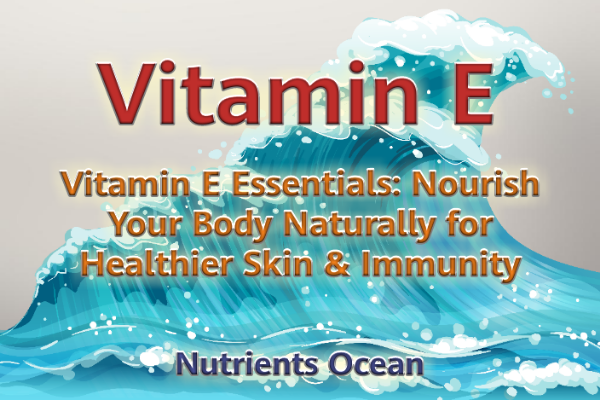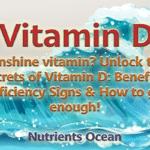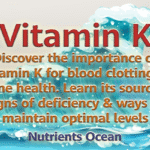Vitamin E
Ever wondered about the unsung hero of the vitamin world? Let’s shine a spotlight on Vitamin E and explore its incredible importance and the array of health benefits it offers. Plus, we’ll dive into the signs and symptoms of its deficiency and how you can tell if you’re running low on this essential nutrient.
Importance of Vitamin E
Vitamin E isn’t just any ordinary vitamin – it’s a powerful antioxidant that helps protect your cells from damage caused by free radicals. This means it’s crucial for maintaining overall health and vitality. Beyond that, Vitamin E supports your immune system, promotes healthy skin, and even aids in the formation of red blood cells. Talk about a multitasking marvel!
Health Benefits of Vitamin E
1. Antioxidant Armour:
Vitamin E swoops in to neutralise harmful free radicals, reducing the risk of chronic diseases like heart disease and cancer.
2. Skin Saviour:
Thanks to its moisturising and anti-inflammatory properties, Vitamin E keeps your skin glowing, hydrated, and youthful.
3. Immune Booster:
By bolstering the function of your immune cells, Vitamin E helps your body fend off infections like a superhero.
4. Heart Guardian:
Vitamin E lends a hand in preventing the oxidation of LDL cholesterol, which means it’s helping to keep your ticker ticking smoothly.
Food Sources of Vitamin E
Here are some food and natural sources of vitamin E:
1. Almonds:
Almonds are rich in vitamin E and make a convenient and tasty snack. They also provide healthy fats and protein.
2. Sunflower Seeds:
These seeds are packed with vitamin E and make a great addition to salads, yogurts, or enjoyed as a standalone snack.
3. Spinach:
Spinach is a nutrient-rich leafy green vegetable that contains vitamin E along with other essential vitamins and minerals.
4. Avocado:
Avocado is not only delicious but also a good source of vitamin E. It can be added to salads, sandwiches, or enjoyed as guacamole.
5. Wheat Germ Oil:
Wheat germ oil is one of the highest sources of vitamin E. It can be used in salad dressings or drizzled over dishes for a nutritional boost.
6. Sunflower Oil:
This cooking oil is rich in vitamin E and can be used for cooking or as a salad dressing.
7. Hazelnuts:
Hazelnuts are another excellent source of vitamin E and can be eaten raw, roasted, or incorporated into various dishes.
8. Broccoli:
Broccoli is a versatile vegetable that contains vitamin E, along with other vitamins and minerals. It can be steamed, roasted, or added to stir-fries.
Incorporating these foods into your diet can help ensure you’re meeting your vitamin E needs, which is important for maintaining overall health and well-being.
Signs and Symptoms of Vitamin E Deficiency
1. Muscle Weakness:
If you’re feeling weaker than usual, especially in the muscles, it could be a sign of Vitamin E deficiency wreaking havoc on your nerves.
2. Vision Woes:
Struggling with vision problems, particularly in dim lighting? Vitamin E deficiency might be dimming your sight.
3. Weakened Immunity:
Frequent bouts of illness or infections might signal that your immune system needs a Vitamin E boost.
4. Skin Struggles:
Dry, rough, or prematurely aging skin could be crying out for more Vitamin E TLC.
Ways to Determine Vitamin E Deficiency
1. Blood Test:
A simple blood test measuring the levels of alpha-tocopherol, the active form of Vitamin E, can provide insight into your status.
2. Physical Examination:
A healthcare professional can assess symptoms like muscle weakness or vision problems during a physical exam.
3. Dietary Check-in:
Keeping tabs on your intake of Vitamin E-rich foods can help you gauge whether you’re getting enough of this essential nutrient.
Don’t overlook the importance of incorporating Vitamin E-rich foods like almonds, spinach, avocado, and sunflower seeds into your diet. However, if your intake falls short, don’t hesitate to consider supplementation, especially if you have specific health concerns or dietary limitations.
In a nutshell, Vitamin E is a superhero nutrient with a laundry list of health benefits, from fighting off free radicals to keeping your skin glowing and your immune system robust. By staying aware of the signs of deficiency and taking proactive steps to maintain adequate levels, you’re investing in your long-term well-being.
So, why not give your body the Vitamin E boost it deserves and reap the rewards of a healthier, happier you?




